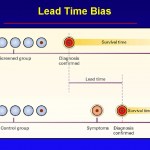mammography
Contrary to what some of my detractors think, I don’t mind criticism of my viewpoints. After all, if I never encounter criticism, how will I ever improve? On the other hand, there are forms of criticism that are what I would call less than constructive. One form this sort of criticism takes is obsessive repetition of points that have already been addressed and failure to pay attention to how they were addressed. This is the sort of criticism that will eventually provoke an exasperated shrug of the shoulders or even an angry—dare I say Insolent?—retort.
Another way criticism can get on one’s…
One of the things that feels the weirdest about having done the same job, having been in the same specialty, for a longer and longer time is that you frequently feel, as the late, great Yogi Berra would have put it, déjà vu all over again. This is particularly true in science and medicine, where the same issues come up again and again and again, often with the same arguments on either side. Sometimes the same players are even involved. So it is with mammography recommendations. Indeed, I'm feeling déjà vu all over again right now, as I read headlines like Women advised to get mammograms later…
Mammography is a topic that, as a breast surgeon, I can't get away from. It's a useful tool that those of us who treat breast cancer patients have used for over 30 years to detect breast cancer in asymptomatic women and thus (or so we hope) decrease their risk of dying of breast cancer through early intervention. We have always known, however, that mammography is an imperfect tool. Oddly enough, its imperfections come from two different directions. On the one hand, in women with dense breasts its sensitivity can be maddeningly low, leading it to miss breast cancers camouflaged by the…
Over the years, I've written a lot about the intersection between the law and science in medicine. Sometimes, I support a particular bill, such as SB 277. Sometimes I oppose a bill, such as right-to-try or laws licensing naturopaths. The case I will discuss here is unusual in that it is a case of the law getting ahead of what the science says in a manner that will likely do little, if any, good for patients, cause a lot of confusion until the science is worked out better, and end up costing patients money for little or no benefit. I am referring to laws mandating the reporting of high-breast-…
Regular readers might be wondering why my output was—shall we say?—less extensive last week than it usually is. I even skipped a weekday and then followed it up with a recycled post from my not-so-super-secret other blog, altered to be a bit more, yes, Insolent. The answer is a single word: Grants. I had a grant deadline. That's basically past now. However, today is a holiday, and, besides taking some time to pay tribute to those who have made the ultimate sacrifice for our country, I also plan on taking a day off from full-scale blogging as well. Fortunately, there are a couple of links to…
A week ago or so, I was perusing my Google Alerts, along with various blogs and news websites, looking for something to blog about, when I noticed a disturbance in the pseudoscience Force. It's a phenomenon I've noticed many times before from a wide variety of cranks and quacks, but it all boils down to how we as supporters of science-based medicine are viewed by those who are, in essence, victims of the quackery that we are trying to combat. I think it's a topic worth revisiting periodically; so here's the 2014 update.
A week ago, Sharon Hill published a post over at Doubtful News entitled…
As I write this, I am winging my way home from the 2014 meeting of the American Association for Cancer Research (AACR, Twitter hashtag #AACR14) in San Diego. (OK, I'm revising this to fit the format and, of course, the Insolence of this particular blog. Shockingly, I didn't have as much time to blog in San Diego as I had thought I would. Go figure.) Basically, the AACR meeting is one of the largest meetings of basic and translational cancer researchers in the world. I try to go every year, and pretty much have succeeded since around 1998 or 1999. As an "old-timer" who's attended at least a…
The last couple of weeks, I've made allusions to the "Bat Signal" (or, as I called it, the "Cancer Signal," although that's a horrible name and I need to think of a better one). Basically, when Bat Cancer Signal goes up (hey, I like that one better, but do bats get cancer?), it means that a study or story has hit the press that demands my attention. It happened again just last week, when stories started hitting the press hot and heavy about a new study of mammography, stories with titles like Vast Study Casts Doubts on Value of Mammograms and Do Mammograms Save Lives? ‘Hardly,’ a New Study…
One of the more depressing things about getting much more interested in the debate over how we should screen for common cancers, particularly breast and prostate cancer, is my increasing realization of just how little physicians themselves understand about the complexities involved in weighing the value of such tests. It's become increasingly apparent to me that most physicians believe that early detection is always good and that it always saves lives, having little or no conception of lead time or length bias. A couple of weeks ago, I saw another example of just this phenomenon in the form…
One issue that keeps coming up time and time again for me is the issue of screening for cancer. Because I'm primarily a breast cancer surgeon in my clinical life, that means mammography, although many of the same issues come up time and time again in discussions of using prostate-specific antigen (PSA) screening for prostate cancer. Over time, my position regarding how to screen and when to screen has vacillated—er, um, evolved, yeah, that's it—in response to new evidence, although the core, including my conclusion that women should definitely be screened beginning at age 50 and that it's…
Let's see. Now that I'm back from Chicago, having recently attended a major cancer meeting, not to mention having already blogged about the meeting, what to do next? Sure, the whole thing about Andrew Wakefield finding himself just one step away from appearing on Jeff Rense's or Alex Jones's radio show was amusing in the extreme to me, and no doubt there will be much more blogging material to mine in that vein, but if you really want to bring home the crazy there's only one place shy of Whale.to to visit.
That's right, I'm talking about that wretched hive of medical scum and villainy, Mike…
Screening for disease, especially cancer, is a real bitch.
I was reminded of this by the publication of a study in BMJ the very day of the Science-Based Medicine Conference a week and a half ago. Unfortunately, between The Amaz!ng Meeting and other activities, I was too busy to give this study the attention it deserved last Monday. Given the media coverage of the study, which in essence tried to paint mammography screening for breast cancer as being either useless or doing more harm than good, I thought it was imperative for me still to write about it. Better late than never, and I was…





